
"Childhoods of exceptional people" by Henrik Karlsson
 2023-02-14
2023-02-14
https://www.lesswrong.com/posts/CYN7swrefEss4e3Qe/childhoods-of-exceptional-people
This is a linkpost for https://escapingflatland.substack.com/p/childhoods
Let’s start with one of those insights that are as obvious as they are easy to forget: if you want to master something, you should study the highest achievements of your field. If you want to learn writing, read great writers, etc.
But this is not what parents usually do when they think about how to educate their kids. The default for a parent is rather to imitate their peers and outsource the big decisions to bureaucracies. But what would we learn if we studied the highest achievements?
Thinking about this question, I wrote down a list of twenty names—von Neumann, Tolstoy, Curie, Pascal, etc—selected on the highly scientific criteria “a random Swedish person can recall their name and think, Sounds like a genius to me”. That list is to me a good first approximation of what an exceptional result in the field of child-rearing looks like. I ordered a few piles of biographies, read, and took notes. Trying to be a little less biased in my sample, I asked myself if I could recall anyone exceptional that did not fit the patterns I saw in the biographies, which I could, and so I ordered a few more biographies.
This kept going for an unhealthy amount of time.
I sampled writers (Virginia Woolf, Lev Tolstoy), mathematicians (John von Neumann, Blaise Pascal, Alan Turing), philosophers (Bertrand Russell, René Descartes), and composers (Mozart, Bach), trying to get a diverse sample.
In this essay, I am going to detail a few of the patterns that have struck me after having skimmed 42 biographies. I will sort the claims so that I start with more universal patterns and end with patterns that are less common.
More Episodes
Create your
podcast in
minutes
- Full-featured podcast site
- Unlimited storage and bandwidth
- Comprehensive podcast stats
- Distribute to Apple Podcasts, Spotify, and more
- Make money with your podcast
It is Free
- Privacy Policy
- Cookie Policy
- Terms of Use
- Consent Preferences
- Copyright © 2015-2024 Podbean.com





